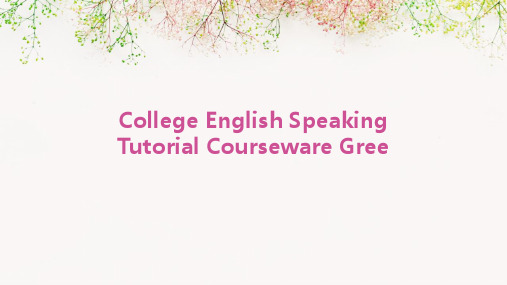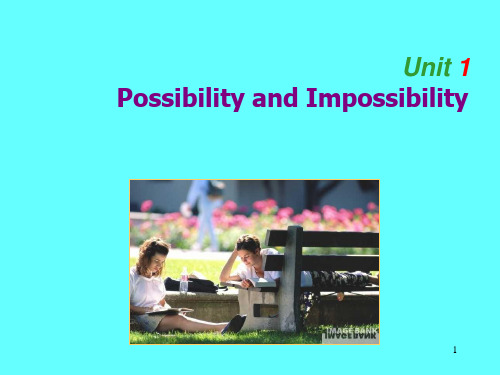应用型大学英语口语教程课件
合集下载
新应用大学英语ppt课件ppt课件ppt课件

Improve writing and expression skills
Students need to improve their writing expression skills through English writing exercises. At the same time, students need to master writing skills, such as conceptualizing article structure, selecting appropriate vocabulary and grammar, and expressing viewpoints.
VS
Improve oral expression ability
Students need to improve their oral expression skills through English oral communication. At the same time, students need to master oral expression skills, such as clear pronunciation, using appropriate intonation, and expressing opinions.
Active listening
Non verbal communication
Verbal communication
Language proficiency: Professional language skills are essential for effective cross cultural communication Fluency in both verbal and written communication enables individuals to express themselves clearly and understand messages. Fluent language skills enable individuals to express themselves clearly and understand information.
大学英语口语教程课件greetingandintrodu

How to conduct effective self introduction
01
02
03
04
Introduce yourself with a clear statement of your name and purpose
Introduce yourself with a clear statement of your name and purpose
Use open questions to encourage the listener to engage with the introduced person
05
Common errors and precautions
Common misconceptions in greetings and
Practice
Students can practice their business introduction skills through simulations and role-playing activities that mimic real-world business scenarios.
introductions
要点一
要点二
要点三
Mistaking the cultural context
It is essential to understand the cultural differences in greetings and introductions. For instance, in some cultures, eye contact is essential, while in others it may be considered disrespectful.
Unit5-应用型大学英语口语教程课件

Part One Pre-Speaking
Summary: Summarize the origins of different individual sports, and fill them in the table below.
tug of war tennis swimming, rugby, soccer basketball marathon
Part One Pre-Speaking
A. Pronunciation Vowels:单元音:[u:] [u]
Part One Pre-Speaking
B. Vocabulary Task1: Students are supposed to learn the vocabularies on page78
Part One Pre-Speaking
Reference:
Great Britain
Word Bank
Swimming originated in Great Britain.
Part One Pre-Speaking
Reference:
America
Word Bank
Basketball definitely came from America.
Part One Pre-Speaking
Reference:
Great Britain
Word Bank
Rugby and soccer originated in the same country ——Great Britain.
Part One Pre-Speaking
Reference:
Task2: Read the following useful expressions and then try to make sentences with them.
大学英语口语教程全书课件完整版ppt全套教学教程最全电子教案电子讲义(最新)

Thank
End you
Unit 2 Campus Life
How do like your campus life as a freshman?
register
life in dorm
military drill
What do you expect most for your campus life?
A: Porsche is my dream car.
B: Welcome to take photos.
A: Okay, I will when I have finished my work on hand. See you.
B: See you around.
Байду номын сангаас
Task 3
A: Good afternoon, sir. (1) _E__x_cu_s_e__m_e_,_i_s_t_h_is_M__r_C_l_a_rk_'_s_o_ff_ic_e___ (请问这里是克 拉克先生的办公室吗)? B: Yes, boy. (2) _I'_m__h_is_s_e_c_r_e_ta_r_y__ (我是他的秘书). What can I do for you? A: (3) _O__h_, _I'_m__D_a_v_id__B_ro_w__n__ (噢,我是戴卫·布朗). Mr. Clark is the adviser of my thesis. Is he free now? B: Do you have an appointment? A: (4) _H__e_a_s_k_e_d_m__e_t_o_m__e_e_t_h_im__a_t his offic_e_a_t_3__p_m_ (他叫我下午三点到他办公 室见他). B: Wait a minute. Let me check whether he’s available now. A: Okay, thank you.
大学英语口语课PPT课件

• CurlyTemple:
• I had a four week return flight and only this much time away from work. In the last three days of my trip a scuba shop in Panama said they saw talent in me and asked me to stay and do an apprenticeship. It was the hardest decision I ever made to call my boss to say I wouldn't be there on Monday, but also the best thing I've ever done.
• The successful applicant will be responsible for providing written reports and analysis on the overall bathing experience.
• Before you apply, make sure you meet the criteria, which is to be laid back, relaxed and bubbly!
already taken some courses on that and have learned
effective techniques.
2021
8
3. What is your expected salary?
• Do not answer this question right away .
2021
大学英语口语教程课件Greetingandintrodu课件

When introducing high ranking individuals, it is essential to use formal language and avoid any misses or omissions that may cause concern or violence
Expand interpersonal relationships
Greetings and introductions are an opportunity to connect with new people and expand your social circle They provide a chance to meet people with similar interests or backgrounds, leading to potential new friendships or business relationships
College English Speaking Course Courseware Greetin
目
CONTENCT
录
• The importance of meetings and introductions
• Common meeting methods • The content and techniques of
self introduction • Introduce etiquette and
techniques to others • Practical dialogue and
simulation scenarios
01
The importance of meetings and introductions
教学课件 应用型大学英语口语教程1

1. Pleased to meet you.
2. Hi ya. / Hey there.
3. How are you doing? 4. I haven’t seen you for a while.
A. Yeah, it has been ages. B. Pleased to meet you, too. C. Hey, you. D. Doing fine. / Well, thanks.
It is an informal greeting by slapping hands together.
2. In social situations, what should we do if we want to introduce a man and a woman?
In social situations, a man is usually introduced to a woman.
Part B Oral D Translation irections: Please translate the following Chinese into English.
3. 你的家人怎么样?(family)
How is your family?
4. 我是个充满好奇心的人。(curious)
Introductions and Farewells
Part A Warming-up
Part B Oral Translation
Part C Theme Reading
Part D Group Work
Part E Speaking and Writing
WarmingD up irections: Try to match the greetings with the proper responses.
英语口语教程-unit课件

having twins? B. That isn’t very likely. There’s not much chance of that happening. A. Oh? Are you absolutely sure about that? B. Yes, I am pretty certain. In fact, if you had twins, I’d be very
• B: Then, good luck!
• A: Thanks. It could happen.
20
• A: Mr. Wang, do you think you will go anywhere this summer?
• B: It’s possible.
• A: Where would you like to go?
• ……
15
What is this? a slice of bread16
Unit 1
Possibility and Impossibility
Topic
Part C
to
Dis to discuss the following statements. Then tell the class about your discussion.
12
• There is a strong / some possibility that ……
• There is a strong / some possibility of that. • There is a high probability that … … • There is a high probability of that. • There is some likelihood that … … • There is some likelihood of that.
• B: Then, good luck!
• A: Thanks. It could happen.
20
• A: Mr. Wang, do you think you will go anywhere this summer?
• B: It’s possible.
• A: Where would you like to go?
• ……
15
What is this? a slice of bread16
Unit 1
Possibility and Impossibility
Topic
Part C
to
Dis to discuss the following statements. Then tell the class about your discussion.
12
• There is a strong / some possibility that ……
• There is a strong / some possibility of that. • There is a high probability that … … • There is a high probability of that. • There is some likelihood that … … • There is some likelihood of that.
- 1、下载文档前请自行甄别文档内容的完整性,平台不提供额外的编辑、内容补充、找答案等附加服务。
- 2、"仅部分预览"的文档,不可在线预览部分如存在完整性等问题,可反馈申请退款(可完整预览的文档不适用该条件!)。
- 3、如文档侵犯您的权益,请联系客服反馈,我们会尽快为您处理(人工客服工作时间:9:00-18:30)。
Word Bank culture shock know the difference respect polite study books do the same equal mutual understanding body language
Part One Pre-Speaking
Reference: When in Rome, do as the Romans do.
References: China: In old times, bowing, and kowtowing; nowadays, waving,
shaking hands, nodding, smiling, hugging, etc. Thailand: In Thailand, people greet each other by putting their
hands together and bowing slightly. South America: In South America, you can expect to be hugged
when you meet someone.
Part One Pre-Speaking
Middle East: In the Middle East, Arabs usually greet each other by touching noes, which is also called “Eskimo kissing”.
Part One Pre-Speaking
Discussion 1: What kind of body ge do people usually use to greet each other in other countries?
Part One Pre-Speaking
Word Bank put the palms together touch cheeks touch noses
Part One Pre-Speaking
Reference:
Japan
In Japan , people bow to each other when they meet.
Part One Pre-Speaking
Discussion 2: What should people from different countries or cultural backgrounds do when meeting for the first time?
In the Middle East, Arabs greet each other by touching noses.
Part One Pre-Speaking
Reference:
U.S.A.
Word Bank
In the U.S.A. , people shake hands when meeting each other.
Part One Pre-Speaking
Reference:
Holland
Word Bank
When Dutch people meet, they kiss each other on one cheek and then the other. If you are a close friend or relative, then you get three kisses!
3. understand cultural background related to greeting
Contents
Part One Pre-Speaking
Question 1: How do people greet each other in China?
Part One Pre-Speaking
Part One Pre-Speaking
Reference:
Thailand
Word Bank
In Thailand, people greet each other by putting their hands together and bowing slightly.
Part One Pre-Speaking
应用型大学英语口语教程
Unit One Greeting
复旦大学出版社 主编 贺春英
Objectives
Students will be able to:
1. master skills of pronunciation
2. improve abilities of making dialogues and presentations
Part One Pre-Speaking
Summary: Summarize the main differences of ways of greeting in different countries or areas, and fill them in the table on page3.
Reference:
South America
Word Bank
In South America, you can expect to be hugged when you meet someone.
Part One Pre-Speaking
Reference:
Middle East
Word Bank
References:
In old times, such as the Qing Dynasty, people of low social status usually bowed or even kowtowed to greet rich people and officials. They also did the same to greet their parents or teachers. Nowadays people are equal, so when they meet each other, they usually say just hello, wave, smile, exchange a nod , hug or shake hands. Sometimes lovers will greet each other with a hug or kiss.
Part One Pre-Speaking
Reference: When in Rome, do as the Romans do.
References: China: In old times, bowing, and kowtowing; nowadays, waving,
shaking hands, nodding, smiling, hugging, etc. Thailand: In Thailand, people greet each other by putting their
hands together and bowing slightly. South America: In South America, you can expect to be hugged
when you meet someone.
Part One Pre-Speaking
Middle East: In the Middle East, Arabs usually greet each other by touching noes, which is also called “Eskimo kissing”.
Part One Pre-Speaking
Discussion 1: What kind of body ge do people usually use to greet each other in other countries?
Part One Pre-Speaking
Word Bank put the palms together touch cheeks touch noses
Part One Pre-Speaking
Reference:
Japan
In Japan , people bow to each other when they meet.
Part One Pre-Speaking
Discussion 2: What should people from different countries or cultural backgrounds do when meeting for the first time?
In the Middle East, Arabs greet each other by touching noses.
Part One Pre-Speaking
Reference:
U.S.A.
Word Bank
In the U.S.A. , people shake hands when meeting each other.
Part One Pre-Speaking
Reference:
Holland
Word Bank
When Dutch people meet, they kiss each other on one cheek and then the other. If you are a close friend or relative, then you get three kisses!
3. understand cultural background related to greeting
Contents
Part One Pre-Speaking
Question 1: How do people greet each other in China?
Part One Pre-Speaking
Part One Pre-Speaking
Reference:
Thailand
Word Bank
In Thailand, people greet each other by putting their hands together and bowing slightly.
Part One Pre-Speaking
应用型大学英语口语教程
Unit One Greeting
复旦大学出版社 主编 贺春英
Objectives
Students will be able to:
1. master skills of pronunciation
2. improve abilities of making dialogues and presentations
Part One Pre-Speaking
Summary: Summarize the main differences of ways of greeting in different countries or areas, and fill them in the table on page3.
Reference:
South America
Word Bank
In South America, you can expect to be hugged when you meet someone.
Part One Pre-Speaking
Reference:
Middle East
Word Bank
References:
In old times, such as the Qing Dynasty, people of low social status usually bowed or even kowtowed to greet rich people and officials. They also did the same to greet their parents or teachers. Nowadays people are equal, so when they meet each other, they usually say just hello, wave, smile, exchange a nod , hug or shake hands. Sometimes lovers will greet each other with a hug or kiss.
